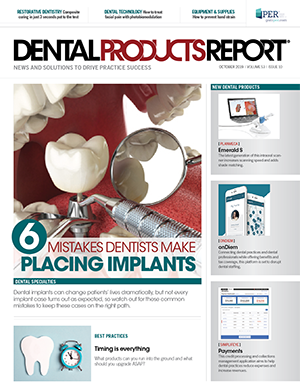A new standard in dental staffing
Real-time staffing service onDiem delivers quality employees to dental practices, and health benefits to those employees.
© Antonioguillem/Adobe Stock

If you’ve had reason to think about the “gig economy” recently, it might be thanks to the Lyft driver who took you to the airport or the Postmates delivery person who brought lunch to your office on a busy day last week.
A close observer of the news might even have seen the news in early September reporting that California passed a landmark gig economy rights bill, paving the way for approximately one million gig workers to have access to basic protections such as minimum wage and unemployment insurance. If “gig” is a concept that seems irrelevant to you, think again-think “freelancing.”
Most dental practices are considered small businesses, employing fewer than 50 people and open an average of four days a week, creating a unique labor pool of part-time employees. The reality is many dental team members-hygienists and assistants in particular-are gig economy workers.
What does that mean for you? Joe Fogg, CEO of onDiem, a new nationwide dental staffing solution, sees this as an opportunity for dentists to embrace new solutions. We had the chance to talk with him about the burdens onDiem can lift from employers’ shoulders and the value it can create for employees including-no joke-providing healthcare coverage.
TC: Talk to me about the idea that became onDiem. What was going on in your world that brought the specific staffing challenges of the dental industry to your attention, and what made you think you were the guy to do something about it?JF:
Right before I started this conversation with you, I was in the elevator with seven gig workers. We’re based in Portland, Ore., and actually share our building with Amazon Prime Delivery. A lot of the people who drive for Amazon also drive for Uber and Lyft. It is all about the gig economy around here.
A couple of days ago, I was reading the latest issue of Fast Company, which included an article about mobile dental clinics and pop-up dentistry intended to serve corporations and their employees who don’t have time to go to the dentist. I had that idea eight years ago.
In my work, I’ve always been good at figuring out companies’ value propositions and how to differentiate, and I’d scaled a couple of other businesses to successful exits.
I always tried to take great care of my employees so that I could retain good talent, and at that time, my team was having a hard time making it to the dentist because we were so busy. In looking into options for our situation, I had an idea to create an app like OpenTable, where people could make reservations and a mobile dental clinic-a nice, semi-tractor trailer version-would roll-up.
As I was working on forecasting and realizing the unique aspects of the business-open fewer days a month than traditional businesses, significant potential losses when staff is out-I saw two things that went on to shape onDiem: First, dental practices require reliable, qualified clinical staff to care for patients. When a team member calls in sick, it isn’t just inconvenient, it significantly reduces revenue. And second, there are thousands of part-time workers who want to work more and were using limited tools like social media to find available positions. There was no end-to-end option that managed that process. We started onDiem to fill that gap.
Today, our app represents a true win-win for the dentist and the dental team, saving precious production dollars for the employer and helping part-time employees earn extra money and, most significantly, participate in a group healthcare plan not typically available to temporary staff.
Both dental practices and dental professionals can post profiles in the app for free, both for permanent jobs and temporary work. Posting your needs doesn’t cost a thing. In the event that a position is filled and works, then we charge the employer a percentage of the labor. The employee is never charged.
We’ve created software that removes the friction of hiring; we take care of vetting for state license verifications and background checks, we cover malpractice, workers’ comp and navigate state and federal labor laws, tax laws, and state dental practice acts so you don’t have to. We are designed for ease.
TC: One of the things I love about your app is how simple it is. Post jobs, see jobs, accept jobs, get compensated efficiently for a job well done. As you survey the market around staffing solutions, what do you think has prevented other companies from creating a model like yours sooner?
JF: A couple of things. Number one is that while the software is designed for ease, being registered to do business in every state in the country and establishing the back office infrastructure to manage millions of dollars in weekly payroll is actually a lot of work. We’ve set it up so that, on the dental professional’s end, these parts move seamlessly. The other significant challenge is getting all of that established while simultaneously funding app development, hiring developers, and figuring out our market strategy.
There are many platforms that exist to match people to work-from dog walking to photography and more. But we went a step further and did the non-easy parts that allow us to treat staff like people, not puzzle pieces, but managed to make it look easy.
TC: As you meet with dentists and encourage them to post jobs through onDiem, what is holding them back? Are there questions or concerns you hear consistently?JF: I think the practices the most engaged with what onDiem offers are those who are utilizing things like Airbnb or Uber and get the gig economy; they love what we’re doing. They see the value in getting to select the dental professional who shows up, not just who they are, but what they’re familiar with in terms of technology or specialty procedures.
With onDiem dental professionals and practices with open positions can set up profiles, set their own financial terms, and get down to providing great dental care.

In some cases, dental practices are using our service to facilitate working interviews, assessing if the person would be a good long-term fit. The same goes for the staff, deciding if that practice is an environment they’d like to work in long-term.
For smaller practices, older practices, there is some apprehension. Having to use a new service can be intimidating and inertia is powerful. For practices that want to grow or expand, onDiem can be a game-changer.
For example, a doc has always wanted to add Thursdays to the schedule, but current team members aren’t available on that day, and hiring a full-time new employee isn’t an option. With us, that practice can bring in the same temp every Thursday and do a meaningful trial on extended hours. The biggest expense is always payroll, and to try something new without that fixed expense is a huge opportunity.
TC: onDiem is a nationwide staffing solution, able to serve everyone from small neighborhood practices to large practices with operations across multiple states. What is remarkable is that you are also fully compliant within all those states. It is clear how this can benefit the dentist or the employer, but how does this scale change how you’re able to serve the dental hygienist or dental assistant?
JF: I want to say just one more thing about the benefits to the practice itself! There are so many dollars spent on patient retention, SEO, and acquiring new patients. If you spend all that money and then have to reschedule those patients because of a staffing issue, you basically spent it all just to lose it, getting hit twice. We can help make sure that doesn’t happen!
But to answer your question about scale and serving staff. This is where benefits really are the thing. There is so much anxiety and confusion-can I be an independent contractor or 1099? The answer is, they can’t. Even though it is the proper way to go, it can be a burden to add a temp to payroll, so often dentists will try to make it easier and just write a check, making them a 1099. There’s a lot at risk in that strategy, most serious being that the practice can get fined, but also, that as a 1099, the employee isn’t covered by workers’ comp and it is likely they didn’t set their rate expecting to cover the employer portion of taxes, so they make less money.
With onDiem, staff are a W2 employee. We cover employer-paid taxes and no one is having to go through the hassle of adding a person to payroll or following up on payment. Staff can earn more money doing what they love.
After working just one shift, dental professionals are eligible for our healthcare plan. The plan is set up to be as flexible as the workforce that needs it: Team members don’t need to work each week, but can remain covered so long as they work at least once a week every six weeks.
The Fixed Indemnity medical plan does not have co-pays or deductibles (prescription, vision, and dental do). Fixed Indemnity medical also doesn’t have a pre-existing condition limitation. Those things, plus the fact that the Fixed Indemnity medical plan uses First Health Network-one of the nation’s largest PPO networks-are the aspects of this plan that we are really excited about.
TC: You could have just stopped with a good app. Why go the extra mile with workforce benefits?
JF: I believe that when you take care of employees, they take better care of customers, and customers take care of your business. I believe that if we could take care of this labor force, they’ll take better care of patients and the dental practices they represent, and those practices will take better care of our company. To get them excited about onDiem, we needed to make it valuable to them, and the peace of mind that comes from healthcare is no small thing.
